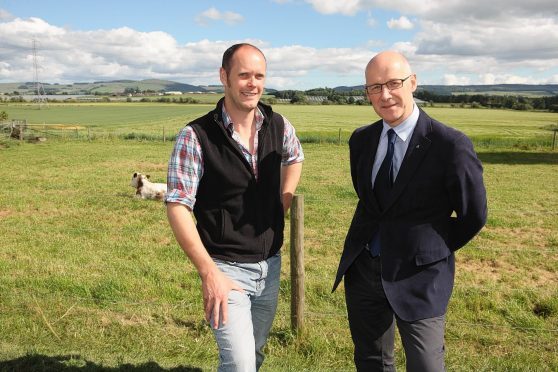Deputy First Minister John Swinney yesterday said the Scottish Government would do all it could to ensure nothing happened during the Brexit negotiations which could harm Scottish agriculture.
During a visit to Leitfie Farm at Alyth near Blairgowrie, Mr Swinney: “It’s really important that nothing happens during the process that damages the strength of Scottish agriculture because that’s the foundations upon which Scotland’s food and drink industry is founded and that’s one of the critical elements of the export programmes of the last few years.”
Retaining a strong agricultural sector was key to maintaining Scotland’s booming food and drink sector, added Mr Swinney.
The visit to the farm, which is run by Ben Barron, was organised by the east central region of NFU Scotland.
The union’s chairman for the region, Roddy Kennedy, said Mr Swinney had been invited to Leitfie to discuss the implications of a Brexit as well as local issues such as flooding and the damage caused by beavers on many farms along the River Tay.
He said politicians needed to ensure agriculture was not used as a bargaining tool when the UK negotiated trade deals with other countries after it left Europe and that subsidy support continued.
“We have two years of our subsidies guaranteed at the moment and then we have to press government to give us the same as Europe is getting so we are on an equal footing,” said Mr Kennedy.
Mr Swinney assured the Perthshire farmers that government was working to make sure that “the things the people in Scotland voted to retain were protected as a consequence of the actions that we take”.
The Deputy First Minister, who is the MSP for Perthshire North and Cabinet Secretary for Education, was referring to relationships, including trade deals, with Europe.
On the issue of flooding, Mr Swinney said he and colleagues in government recognised the role the agricultural community played in river and watercourse management.
“I have always encouraged a very active dialogue with Sepa about how we take proactive preventative steps to make sure we are taking wise decisions about flood management,” said Mr Swinney.
“I get the sense that there’s a much more co-operative pragmatic approach to establish what can be done. Maintaining good drainage and flood management activities are critical to not just agriculture but to the whole area.”
He said he had heard arguments both for and against the reintroduction of beavers and this was an issue Cabinet Secretary for Environment Roseanna Cunningham was currently deciding on.
